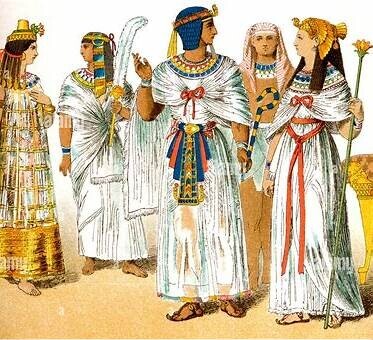When I explore the tapestry of Ancient Egyptian civilization, I can’t help but marvel at how the nobility were the gears that kept the societal machine moving. This elite class wasn’t just about opulence and prestige; it was made up of individuals who held the reins of the country’s administration, influenced its culture, and upheld its religious traditions.
Picture if you will, a society where the power structure was as layered as the pyramids they built. At its zenith stood the pharaoh, revered as a god-king. But the scaffolding supporting his rule was an intricate network of family members, loyal officials, and affluent landowners. Together, they forged a robust administrative and governance framework that sustained one of history’s most illustrious civilizations.

Their hands directed everything from grandiose construction projects and military campaigns to the subtleties of daily governance and religious rites. What’s more, they were the stewards of Egypt’s wealth, overseeing vast tracts of land that fed and enriched an empire.
In this article, I’ll take you through the layers of this class, shining a light on their place in history. You’ll discover the intricacies of their hierarchy, and the weight of their roles and responsibilities. So stay with me, as I set the stage for a deeper understanding of these influential figures, before plunging into the specifics of their societal structure and composition in the next section.
Hierarchy and Structure of Egyptian Nobles
If I were to pull back the curtain of time to Ancient Egypt, a vivid social pyramid would reveal itself, with the nobility cast in its significant tiers. At this point, you might imagine the pharaoh as the apex of the pyramid, an omnipotent figure both divine and mortal. Directly beneath the divine ruler were their closest allies and confidants: the nobility. Comprising the noble class were the pharaoh’s kin, the most trusted of officials, the stewards of spirituality – the priests, the stalwarts of military might, and the landed aristocracy whose swathes of fertile Nile lands yearned with golden harvests.
This stratified social system was no accident but a meticulously crafted hierarchy. At its helm stood the pharaoh, a god amongst mortals, ruling with an absolute hand that both gave life and meted out judgment. Below the pharaoh, serving as the right hand of the throne, was the vizier, a position equivalent to a modern-day prime minister. The vizier was a linchpin of ancient governance, tasked with critical state decisions and the administration of justice.

Spreading outwards from the vizier were the nomarchs, the regional power players who governed Egypt’s numerous nomes, or provinces. Their reach extended far and wide, overseeing the ebb and flow of daily life in their jurisdictions. They wielded power that could rival the central authority, especially when left unchecked. Priests, keepers of sacred rites and temple treasures, helmed the religious facet of society, their influence both otherworldly and deeply entwined in the state’s affairs. High-ranking military leaders stood guard over the nation and its interests, with valor as their creed and war-chariots their trusty steeds, upholding the pharaoh’s desire for security and expansion.
Understanding this structure is KEY to grasping the roles nobles played in not only shaping governance but also in sculpting the realms of the religious and military sectors. These elites held the reins of the country’s administration, and through their actions, they chiseled the path for Egypt’s historical trajectory. The ensuing segment will illuminate the specific administrative functions that were the pulse of their authority and ensured the continuity of this ancient civilization.
Governance and Public Administration: The Realm of the Nobles
The nobility in Ancient Egypt didn’t just wear titles; they were the backbone of the civilization’s governance. These individuals didn’t simply stand in the shadow of the pharaoh; they were his arms extending across the land. Imagine a government today without its local officials, its tax offices, its departments of public works, its stewards of the law. That was the kind of vacuum the nobles filled in their time.
A noble’s home was his province, and the wellbeing of that province was his primary responsibility. They made sure the pharaoh’s laws were upheld and public order maintained. It was a job that required a judicious nature, keen on balancing divine royal decreacies with the daily needs of the populous.

These nobles were more than administrators; they were the treasurers of Egypt’s wealth. Taxes were not just about monetary dues; they involved grain, livestock, precious metals, and labor. Ensuring these taxes were fairly assessed and collected, and then properly distributed or stored for times of need, fell squarely on the shoulders of the noble class.
Not only did they oversee taxation, but nobles also directed monumental public works projects that stood the test of time. The temples, the vast irrigation systems, the complex networks of roads linking one part of the kingdom to another; all were under the careful supervision of these powerful individuals. Culturally important and economically essential, these projects required an eye for detail and a command of resources that only the nobility could possess.
Nobles at War: Military Might and Territorial Expansion
The nobility in ancient Egypt was not only managing bureaucratic tasks; they were also at the helm of the country’s military affairs. Egypt’s need to defend its borders and assert influence over neighboring lands put nobles in vital military leadership positions. They were charged with safeguarding the kingdom’s security, and they played critical roles in campaigns aimed at territorial expansion. Here’s a closer look at how these elite individuals shaped Egypt’s military prowess.
Understanding the military facet of their roles shows us nobles were trusted with the defense of Egypt’s borders. They were expected to be strategic thinkers, capable of both devising defense plans and leading soldiers into battle. Evidence from historical records suggests that some nobles even achieved legendary status due to their tactical brilliance and valor on the battlefield.

Commander titles didn’t come without responsibility; nobles were directly involved in the training and organization of the army. From handpicking the finest charioteers to instructing soldiers, they established a strong military foundation. Regular drills and the development of tactical maneuvers under the nobles’ directions underscore their contribution to what was considered one of the most formidable military powers of the ancient world.
Historians have gleaned insight into particular campaigns led by these high-ranking individuals, through reliefs and inscriptions that have withstood the sands of time. One such example is the famous Battle of Kadesh. Strategic war planning and heroic leadership showcased there help us appreciate the sophistication that the noble class brought to warfare.

While this discussion sets the stage for understanding the direct involvement of the noble class in matters of war and defense, it also transitions us towards an examination of their broader economic contributions—particularly through landownership and management of agriculture. In the next section, I’ll explore how nobles’ economic activities further extended their influence beyond military might, underpinning Egypt’s economy and enabling the wealth that fueled its imperial ambitions.
The Economic Impact of Landholding Nobles
The nobility’s influence in Ancient Egypt extended well beyond the courts and battlefields into the very bedrock of the economy. Landownership was predominantly in the hands of the nobles, who managed vast agricultural domains, ensuring the kingdom’s sustained food supply and economic stability.
Owning such expansive estates, the nobles were essentially the chief economic drivers of their time. They monitored the agricultural cycles, from the inundation of the Nile, which their farming depended on, to the harvest that filled the granaries. Their estates were not only centers of agricultural production but also of economic activity, employing a wide range of workers, from scribes to laborers.

In addition to their agricultural pursuits, nobles in Ancient Egypt were also instrumental in the development of national and regional trade networks. Their involvement in trade was multi-faceted, often financing trading expeditions and participating directly in the exchange of goods. This brought about wealth not just for the nobles but also for Egypt, enhancing trade relations with neighboring cultures.
However, the nobility’s role in the economy was not free from complexity. As stewainsds of the nation’s agricultural output and trade, nobles had to navigate the challenges of maintaining a delicate balance between their wealth and responsibilities to the state. They were expected to ensure that their activities aligned with the pharaoh’s broader economic policies.

As we transition from discussing the economic contributions of nobility to the power dynamics they navigated, it’s clear that wealth was a strong lever of influence. In the political theatre, nobles could rely on their economic strength to bolster their standing, sometimes using their resources to create alliances or even challenge the pharaoh when their interests diverged.
The Politics of Power: Advisory Roles and Influence
I must note how the nobles of Ancient Egypt not only held sway over the economics and military might of the civilization but also played a critical part in its political theater. They often served as key advisors to the pharaoh, influencing decisions that ranged from local governance to grand strategy.
Marriage was more than a personal bond; it was a strategic maneuver for noble families. By intertwining their lineages, they could consolidate power and push their influence in political decisions, including matters of succession.

It’s important to highlight the delicate balance of power that existed between the nobility and the pharaoh. Although appointed by the pharaoh and expected to be loyal, the nobles had substantial authority within their own domains. This autonomy sometimes led to power struggles and attempts to resist the control of the central government.
Historical records are peppered with stories of powerful nobles who pushed back against the authority of the pharaoh. These disruptions sometimes culminated in rebellions that necessitated decisive reforms. Such reforms often aimed to centralize power once again and prevent any single noble from gaining too much influence that could threaten the pharaoh’s rule. This push-and-pull dynamic was a recurring theme throughout Egypt’s history.

Moving from these political gambits and schemes, I’ll next discuss the broader historical evolution of Egyptian nobility. This final look will give us the full scope of how nobility was shaped by — and in turn shaped — the society and culture of ancient Egypt.
Conclusion: The Legacies of Noble Stewards
As we’ve seen, the nobility in ancient Egypt were more than just privileged elites; they were stewards of a civilization that has left an indelible mark on human history. From the grandeur of the pyramids to the sophistication of administrative systems, their legacies are visible even today.
The roles and responsibilities of the nobility evolved significantly across the different periods of Ancient Egyptian history, from the centralized authority of the Old Kingdom to the cultural renaissance of the New Kingdom. Each era saw nobles adapting to changing political landscapes, whether through increased regional control or through reforms designed to consolidate power at the center.
The influence of the noble class extended beyond governance and warfare into the realms of economics and culture. They were the patrons of the arts, the overseers of trade, and the organizers of religious life. Their contributions to the Egyptian state and society were multifaceted and essential to the functioning of one of the world’s most remarkable ancient civilizations.
In conclusion, the Egyptian nobility were significant not just to the pharaohs they served, but to the very fabric of Egyptian society. They were the linchpins in a complex societal structure, ensuring stability, advancement, and a legacy that would captivate the imagination of generations to come.

